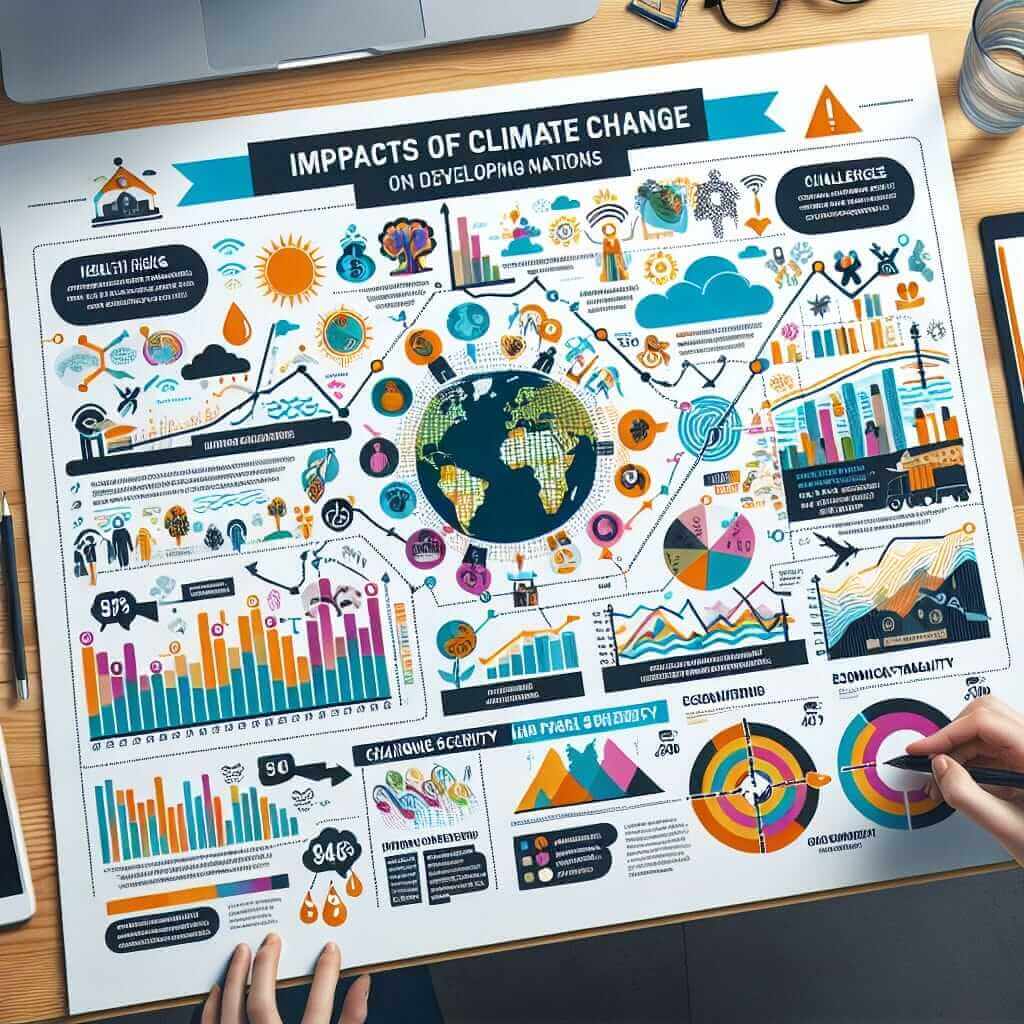The IELTS Reading test is a crucial part of the overall IELTS examination. It consists of 40 questions and is designed to test a wide range of reading skills, including skimming, scanning, and understanding arguments. Given the increasing relevance of climate change, the topic “Social implications of climate change on developing countries” has become a staple in reading passages. This article will delve into this topic, providing a comprehensive practice passage, questions, and detailed answers.
Climate change and its effects on society, particularly in developing countries, have frequently appeared in IELTS reading sections. Understanding this subject not only prepares you for possible questions but also broadens your awareness of global issues.
Practice Reading Passage on Climate Change
The Social Implications of Climate Change on Developing Countries
Climate change is imposing significant challenges on developing countries, which often lack the resources necessary to effectively mitigate and adapt to environmental shifts. The varied impacts on human health, food security, and economic stability illustrate the multifaceted nature of these challenges.
Health Impacts
Climate change exacerbates existing health issues and creates new health risks. Increased temperatures promote the spread of vector-borne diseases like malaria and dengue fever. Additionally, extreme weather events such as floods and droughts can lead to waterborne diseases and compromised food safety, thereby worsening malnutrition, particularly among vulnerable populations.
Food Security
Food security in developing regions is highly susceptible to changing climate patterns. Unpredictable weather, prolonged droughts, and frequent storms jeopardize agricultural productivity. Smallholder farmers, who largely depend on rain-fed agriculture, are particularly vulnerable. The resulting crop failures lead to hunger, increased food prices, and economic instability.
Economic Stability
Economic instability is a broader implication of climate change. With agriculture forming the economic backbone for many developing countries, adverse weather conditions directly harm the economic prospects of these nations. Infrastructure damage due to increased natural disasters further strains financial stability and diverts funds from critical development projects.
Shortcode for Image:

Questions
Multiple Choice
-
What is one health impact of climate change mentioned in the passage?
a. Increased cold weather
b. Spread of vector-borne diseases
c. Decreased temperatures
d. None of the above -
Why are smallholder farmers particularly vulnerable to climate change?
a. They have large-scale operations.
b. They rely on rain-fed agriculture.
c. They use advanced farming technology.
d. They have substantial financial reserves.
True/False/Not Given
- Climate change has no impact on economic stability in developing countries. (True/False/Not Given)
- The increased frequency of storms has little effect on food security. (True/False/Not Given)
Sentence Completion
- Extreme weather events such as floods and droughts can lead to __.
- Crop failures due to unpredictable weather result in __.
Answers and Explanations
Multiple Choice Answers
-
b. Spread of vector-borne diseases
- Explanation: The passage explicitly mentions that increased temperatures promote the spread of diseases like malaria and dengue fever.
-
b. They rely on rain-fed agriculture.
- Explanation: The text states that smallholder farmers, who depend on rain-fed agriculture, are particularly vulnerable to climate changes.
True/False/Not Given Answers
-
False
- Explanation: The passage clearly outlines the economic instability caused by climate change, affecting agriculture and infrastructure.
-
False
- Explanation: The passage mentions that frequent storms jeopardize agricultural productivity, which is directly linked to food security.
Sentence Completion Answers
-
waterborne diseases and compromised food safety.
- Explanation: The passage notes that extreme weather events lead to these health issues.
-
hunger, increased food prices, and economic instability.
- Explanation: This is derived from the section discussing the implications of agricultural disruption.
Common Mistakes to Avoid
- Overlooking Keywords: Always pay attention to keywords in the questions and the passage. They are crucial for identifying the correct answers.
- Skimming Too Quickly: While skimming is necessary, doing it too quickly can lead to missing important details.
- Misinterpreting Questions: Ensure you understand what the question is asking. Reread it if necessary.
Vocabulary
-
Mitigate (verb) /ˈmɪt.ɪ.ɡeɪt/: To make something less severe, serious, or painful.
- Example: Efforts to mitigate climate change include reducing carbon emissions and increasing renewable energy use.
-
Vector-borne diseases (noun phrase): Infections transmitted by the bite of infected arthropod species, such as mosquitoes.
- Example: Malaria is a vector-borne disease spread by mosquitoes.
-
Susceptible (adjective) /səˈsɛp.tə.bəl/: Likely or liable to be influenced or harmed by a particular thing.
- Example: Smallholder farmers are susceptible to climate variability due to their reliance on rain-fed agriculture.
Grammar Points
-
Relative Clauses: Used to give additional information about something without starting a new sentence.
- Example: “Smallholder farmers, who largely depend on rain-fed agriculture, are particularly vulnerable.”
-
Passive Voice: Often used to emphasize the action rather than the subject performing it.
- Example: “Climate change is imposing significant challenges on developing countries.”
Tips for High IELTS Reading Scores
- Practice Regularly: Integrate regular reading practice into your study routine.
- Expand Vocabulary: Focus on learning new words in context and their usage.
- Time Management: Practice under timed conditions to improve your pace without sacrificing accuracy.
- Understand Question Types: Familiarize yourself with various question types and strategies to tackle each effectively.
For further reading practice and strategies, check out our articles on the impact of renewable energy on economic development and the importance of renewable energy investment for future generations.
By working through these practice passages and following the tips provided, you can enhance your reading comprehension skills and perform better in the IELTS Reading test.